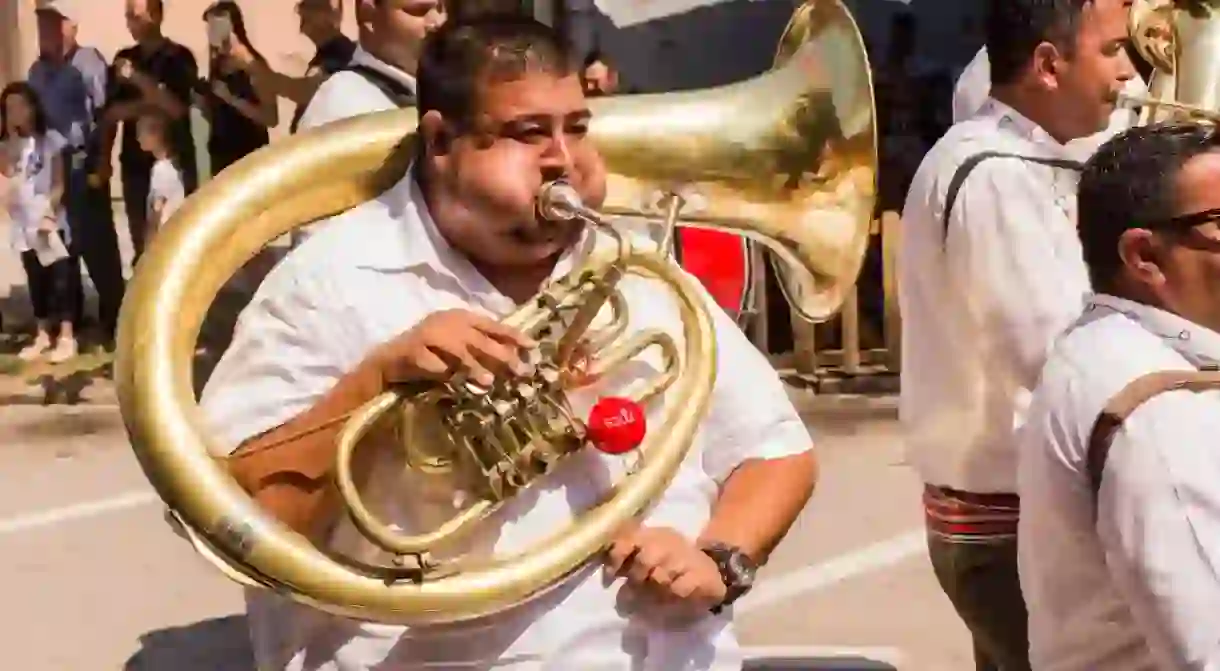A Guide to Serbia's Guča Festival

For 51 weeks of the year, the 3,700 residents of Guča live a sleepy existence in the west of Serbia. Everything changes on week 52, however, as the town is taken over by a chaotic cacophony of trumpets, alcohol and visitors looking for a good time. The Guča Trumpet Festival is unlike anything else on this planet.
There is a temptation to ask the reader to try and imagine the sight, but it is simply impossible. More than 60,000 revellers descend upon the town of Guča for four decadent days of rakija-fuelled partying, soundtracked by some of the best brass bands on the planet. This is the largest trumpet festival in the world.
A history of the Serbian trumpet
Despite being one of the country’s most popular instruments and an integral part of its modern history, the trumpet is not as traditional to Serbia as one might believe. It was primarily used as a military instrument until the late 19th century, when it became popular in villages throughout the Balkans, but the madness of Guča was still a long way away.

Ordinary beginnings
The origins of Guča Trumpet Festival (or the blame, depending on your opinion of brass bands) lie at the door of a news reporter by the name of Blagorje Radivojević, who saw a band of trumpeters performing in the city of Čačak. Impressed by the energy and rambunctiousness of the band, Blagorje recommended adding a trumpet competition to the already existing Dragačevo Festival.
The organisers of the festival weren’t 100% convinced by the idea, and support was difficult to find elsewhere. Luckily for Blagorje and his treasured trumpets, support arrived in the shape of an influential member of the communist party. The decision was made to create an entirely new festival for trumpets and brass bands, and the Guča Trumpet Festival came into being in October 1961. It was a predictably small affair with just four orchestras taking part, but the ball was well and truly rolling.

An explosion of colour and noise
The massive modern popularity of Guča Trumpet Festival didn’t happen overnight. The festival was a (relatively) quiet one until the 1970s, when more and more visitors found themselves heading to the small town three hours south of Belgrade. It found itself featured in international media, where journalists spoke of a ‘different Serbia’, one that was colourful and welcoming as opposed to bland and neurotic.
Some of the most iconic names in the history of brass music have performed at Guča over the years, with varying results. Miles Davis, the wildly influential American musician, famously remarked that he ‘didn’t know a trumpet could be played that way’. International visitors grow in number every single year, eager to see what the fuss is all about.
Those visitors will struggle to hear the fuss over the incredible tumult created by a mass of brass instruments. Colossal amounts of alcohol are drank at the festival, although its growing popularity has seen beer battle rakija for pride of place. Animals are roasted whole on spits, and by the end of the festival the smell is something else itself. Needless to say, this is not a festival for vegetarians (or the faint of heart).

The power of simplicity
The popularity of Guča Trumpet Festival isn’t difficult to understand. This is simplicity in party form, a festival that knows what it does and doesn’t deviate from its strengths. The music is loud, long and plentiful, the food is hearty and honest, and the alcohol is abundant and strong (an understatement). Pretension has no place at Guča, where even the most cynical will find themselves won over by the sheer enthusiasm of it all (or maybe just the rakija).
If you can’t stand the sound that escapes from the tubes of the trumpet, Guča may well be your worst nightmare. But if you just so happen to love drinking, dancing, celebrating, eating and a little more drinking, you might just understand why Guča Trumpet festival is one of the most unique and outstanding festival experiences on the planet.













